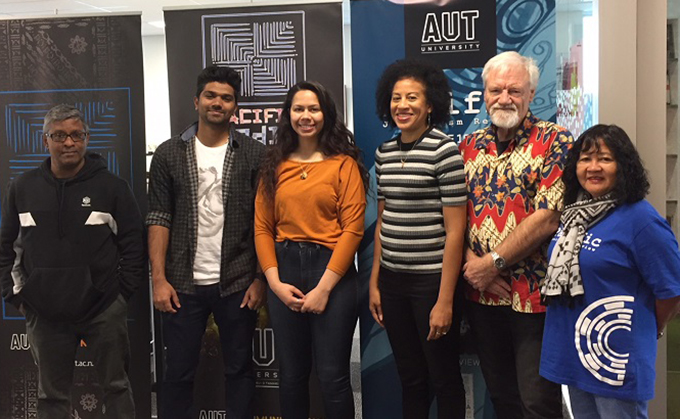A video made by an AUT screen production graduate, Sasya Wreksono, marking the 10th anniversary of the Pacific Media Centre. Video: PMC
PROFILE: By Craig Major of AUT News
Based at Auckland University of Technology, the Pacific Media Centre is a small team dedicated to telling stories from across the Pacific that you won’t read anywhere else.
Established in 2007 by Professor David Robie in AUT’s School of Communication Studies, the centre focuses on postgraduate research projects and publications that impact on indigenous communities across the Pacific.
“We’re a small team, but the scope of what we cover is phenomenal,” Dr Robie explains. “As researchers and reporters, we look at the repercussions that big issues like climate change, human rights violations and press freedom have on these small communities in the Asia-Pacific region.”
The team are active publishers, managing several platforms including the Pacific Media Watch and Asia Pacific Report news websites, the half-yearly academic research journal Pacific Journalism Review and its companion Pacific Journalism Monographs, the blog Niusblog and Toktok, a quarterly newsletter.
The centre has also secured a media partnership with Radio New Zealand – the first content-sharing arrangement between a New Zealand university and a news organisation – and hosts the weekly Southern Cross radio programme on 95bFM.
 Some of the Pacific Media Centre team: Sri Krishnamurthi (from left), Blessen Tom, Leilani Sitagata, Associate Professor Camille Nakhid, Professor David Robie and Del Abcede. Image: Craig Major/AUT
Some of the Pacific Media Centre team: Sri Krishnamurthi (from left), Blessen Tom, Leilani Sitagata, Associate Professor Camille Nakhid, Professor David Robie and Del Abcede. Image: Craig Major/AUT
Dr Robie, along with Advisory Board chair Associate Professor Camille Nakhid, sees the centre as having a strong advocacy role across the Pacific and further afield.
“I think it is a real strength of the PMC that the team can find issues in the Pacific that just aren’t covered in the mainstream New Zealand media, then explore them and report on them with authority and conviction,” Dr Robie says.
Beyond a travel brochure
“The team is skilled in identifying issues that are beyond the scope of what the public sees in a travel brochure.”
Dr Nakhid echoes this sentiment. “New Zealand’s media can be very insular when reporting on what is happening in the Pacific – even though there is so much happening right outside our doorstep.”
Internally the team takes a cross-discipline approach, working closely with students and staff in the School of Communication Studies (particularly Te Ara Motuhenga, the documentary collective) and the School of Social Sciences.
The centre also has international partnerships, such as with the Paris-based Reporters Without Borders, and maintains close ties to Pacific communities based in New Zealand – and are sure to collaborate with community groups for events and seminars.
“Pacific Media Centre organised a seminar about the refugee situation in Myanmar recently,” recalls publications designer Del Abcede. “Through talking to the Burmese citizens that we had invited, we discovered a range of issues that only came to light in the mainstream after the Myanmar election.”
PMC reporting staff – mostly postgraduate students – are encouraged to uncover and explore the issues that interest them.
“Working with the PMC has been very illuminating,” says Sri Krishnamurthi, a postgraduate student who has covered Fiji-based news for PMC, and has interviewed two of the three party heads hoping to win Fiji’s general election next month.
“I have a background in communications and journalism, but doing this kind of reporting has been a real eye-opener,” says Krishnamurthi, a Fiji-born journalist who worked with the NZ Press Association for 17 years.
Film festival screening
And just this week two students from the centre, Hele Ikimotu and Blessen Tom, have had their Bearing Witness climate change documentary, Banabans of Rabi, accepted for screening at the 2018 Nuku’alofa Film Festival.
The trailer of Banabans of Rabi, a short documentary on climate change accepted by the 2018 Nuku’alofa Film Festival. Video: BOR
The freedom to pursue stories in the region is an opportunity for Dr Robie and the team.
“Students that work with us learn so much – and there really is no underestimation of their abilities,” Dr Robie said.
“Not only that, it promotes media and journalism as a viable career path for Pacific students, and leads to opportunities for international journalism projects.”
Article by AsiaPacificReport.nz
]]>








